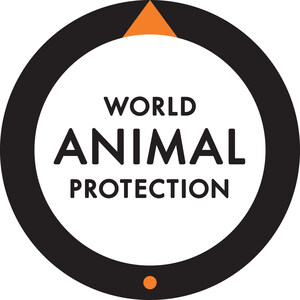NEW YORK, Feb. 7, 2019 /PRNewswire/ -- An investigation by World Animal Protection reveals that Turkish Airlines and Turkish Cargo are enabling the exotic pet trade, despite making commitments to combat wildlife trafficking. The airline and its cargo carrier have been used to illegally transport wild-caught African grey parrots on flights from Democratic Republic of the Congo (DRC), Nigeria and Mali to countries in the Middle East, western and southern Asia.
World Animal Protection released its new report "Wild at heart: The cruelty of the exotic pet trade," which examines the booming global trade in wildlife to be kept as pets at home, also known as 'exotic pets.' Millions of wild animals, including parrots, are being captured from their habitats or born into captivity, to be sold into the exotic pet trade, a growing multibillion-dollar industry that's having a devastating impact on wildlife populations around the world.
Ben Williamson, World Animal Protection US, says:
"Poaching animals for the exotic pet trade is happening on an industrial scale with devastating consequences. Worse still is that the illegal and illicit elements of the trade are often aided by government corruption and inadequate enforcement."
"Animals suffer at every step of their journey to people's homes: from capture to handling, transport, holding, breeding, sale and the lifetime of captivity in the home."
"Shockingly, as recently as August 18, 2018, African grey parrots were transported by Turkish Airlines between Kinshasa and Kuwait via Istanbul, with more than 60 found dead on arrival."
"Turkish Airlines and Cargo flies to 120 countries, more than any other airline, which is why we are calling on them to cease the transportation of all bird species until we have mutual confidence that African grey parrots and other endangered bird species are not being flown on their planes."
Whether traded legally or illegally, keeping wild animals as pets is cruel. The journey they endure is perilous; tortoises, snakes and parrots are cruelly captured from the wild and sold to traders. They are stuffed in crates, often unable to breathe properly or move, and most of these wild animals will sadly suffocate, starve or succumb to diseases before they even reach their new artificial home as a pet.
Once they are in people's homes, there is no realistic way to replicate the space and freedom these animals would have in the wild. Many animals are kept in spaces vastly smaller than their natural habitats, and they don't have the correct nutrition, even if owners have their best intentions to feed them properly.
Alesia Soltanpanah, Executive Director at World Animal Protection US, says:
"Most people buy exotic pets because they love animals – but any wild animal in the exotic pet trade experiences extreme suffering. We are urging people to not buy, own or breed a wild animal as a pet. A life in captivity is a world away from a life in the wild. Wild animals are not pets, they belong in the wild."
Our research reveals that:
- Nearly one third of all wild animals die during transportation.
- A high number of pet snakes, lizards and tortoises die within the first year at home. With natural age ranges from 8-120 years, it is thought that these deaths mostly occur from stress-related illness in captivity.
- Video evidence shows how African grey parrots are typically caught from the wild, with birds being used as bait to lure others. Once landed and trapped, the parrots are forcibly taken by poachers and their feathers hacked off to prevent escape and prepare them for the exotic pet trade.
Visit our website to help end the cruel exotic pet trade and call on Turkish Airlines and Cargo to immediately cease flying all birds on their airlines.
Notes to editors
- For an interview with a spokesperson, contact Carla Pisarro at +1-646-783-2210, [email protected]
- Read World Animal Protection's new report, "Wild at heart: The cruelty of the exotic pet trade" here: https://www.worldanimalprotection.us/sites/default/files/us_files/exotic_pets_campaign_report.pdf
- Report "Illegal online trade in parrots: a groundbreaking investigation" available here: https://www.sciencedirect.com/science/article/pii/S2351989418301768
- B-roll footage, images available here: https://www.dropbox.com/sh/fcddaa2uj7zpwbj/AAAeoFRDR2AB66f3Q-ZAXEaBa?dl=0
SOURCE World Animal Protection
Related Links
WANT YOUR COMPANY'S NEWS FEATURED ON PRNEWSWIRE.COM?
Newsrooms &
Influencers
Digital Media
Outlets
Journalists
Opted In





Share this article